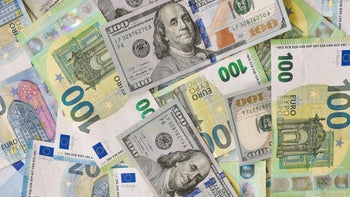This is why Apple didn't raise iPhone prices in the U.S. but did so in other countries

Apple didn't raise the price of the iPhone 14 series in the U.S. and China. Those purchasing one of the two iPhone 14 Pro models received some new features such as the notch replacing, shape-shifting, and multi-tasking Dynamic Island. There were also improvements made to the displays and the cameras on the Pro models, a faster chipset, more memory, and larger batteries.
The strength of the U.S. Dollar forced Apple to raise iPhone prices in certain countries
Yet in the states, the Apple iPhone 14 Pro started at $999 while the iPhone 14 Pro Max was tagged at $1,099 and up. That pricing matches what Apple charged for the iPhone 13 Pro and the iPhone 13 Pro Max. It also matches the pricing for the iPhone 12 Pro and iPhone 12 Pro Max. Heck, it even is the same pricing used on the iPhone 11 Pro and iPhone 11 Pro Max.

Due to the strong Dollar, Apple had to raise iPhone prices in some countries
This streak has to come to an end eventually, and we'd expect that with iPhone 15 redesign, next year will be the perfect time for Apple to raise its pricing in the U.S. for the iPhone 15 Pro models. While Apple doesn't have to switch to a USB-C port in Europe until the fall of 2024, reliable TF International analyst Ming-Chi Kuo says that Apple will get rid of the proprietary Lightning port early and switch worldwide to USB-C with the iPhone 15 line next year.
According to CNBC, the strong dollar is the reason why Apple hiked prices in different countries while keeping them flat in the states. The strong dollar means that when converting foreign revenue into the U.S. dollar, Apple would receive fewer bucks. For example, a year ago each Pound sterling in England that Apple received for selling a product in the country could be converted to $1.35. But problems with the British economy have made the Pound weaker against the dollar.
Today, for every Pound sterling received by Apple, the currency can be converted into $1.14. That's a 15.6% decline and Apple pays the price. So in the U.K., the basic iPhone 14 model was hiked by £70 to £849, an increase of 9%. And the more expensive the iPhone, the higher the increase that Apple announced. Back in the U.K., Apple raised the price of the iPhone 14 Pro Max in the U.K. by £150 over the price of the iPhone 13 Pro Max.
Ironically, having a strong dollar isn't always great for U.S. companies. It might allow them to pay less for supplies, but for a multinational company like Apple, it forces them to hike prices overseas to keep their U.S. Dollar revenue stable. On CNBC, Cook admitted that "The foreign exchange headwinds were over 600 basis points for the quarter. So it was significant. We would have grown in double digits without the foreign exchange headwinds."
Some years Apple ends up eating the cost of foreign exchange fluctuations
Apple CFO Maestri says that foreign exchange is "a very significant factor that is affecting our results, both revenue and gross margin." To help smooth out the effects of currency fluctuation, Apple hedges its exposure as do most global firms. But these hedges aren't always perfect.
Apple also takes a look at the foreign exchange markets around the world when it releases a new product. "In some cases, for example, customers in international markets had to ... they saw some price increases when we launched the new products," Maestri said, "which is not something that, for example, U.S. customers have seen. And that’s unfortunately the situation that we’re in right now with the strong dollar."
In the past, Apple had to eat the cost of foreign exchange fluctuations. In 2019, when the U.S. Dollar also was strong, Apple tried to keep pricing in many markets flat on an annual basis. Foreign exchange fluctuations can lead to huge declines in U.S. Dollar revenue. For example, in Turkey, the lira fell 33% against the dollar in 2019, and sales in the country declined a whopping $700 million.
This year, Apple says it has not seen any drop off in iPhone demand even in markets where fluctuating local currencies forced Apple to hike its prices. Maestri says that Apple achieved double-digit growth in India, Indonesia, Mexico, Vietnam, and other countries even when the results are computed in their declining currencies.
"It’s important for us to look at how these markets perform in local currency because it really gives us a good sense for the customer response to our products, the engagement with our ecosystem, and in general, the strength of the brand," Maestri said during the earnings call. "And I have to say, in that respect, we feel very, very good about the progress that we’re making in a lot of markets around the world."
"It’s important for us to look at how these markets perform in local currency because it really gives us a good sense for the customer response to our products, the engagement with our ecosystem, and in general, the strength of the brand," Maestri said during the earnings call. "And I have to say, in that respect, we feel very, very good about the progress that we’re making in a lot of markets around the world."












Things that are NOT allowed: